Deckers Brands Implements 1 for 6 Stock Split
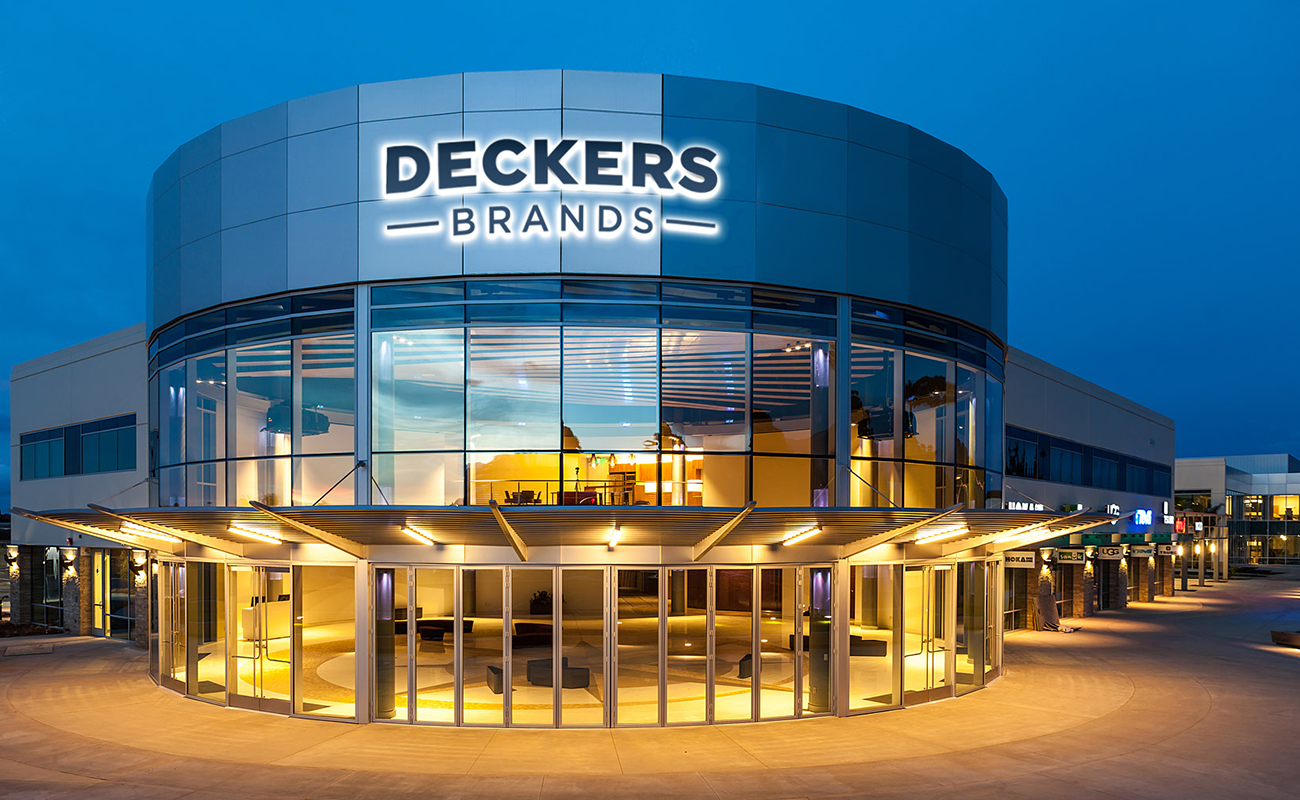
- Deckers Brands (NYSE:DECK) executed a 1 for 6 stock split to make shares more accessible and increase liquidity.
- The stock split was approved by shareholders, indicating strong support for the company's strategic direction.
- Following the stock split, DECK's stock price saw an increase, reflecting positive market reception.
On September 17, 2024, Deckers Brands (NYSE:DECK), a prominent player in the global footwear, apparel, and accessories market, implemented a significant change in its stock structure through a 1 for 6 stock split. This adjustment directly impacts the number of shares each shareholder owns, effectively increasing the total shares available while maintaining the overall value of the company in the market. This move is part of a broader strategy to make DECK's stock more accessible to a wider range of investors, including its employees.
The decision for this stock split came after Deckers Brands' stockholders approved the proposal during the annual meeting on September 9, 2024. The approval was a clear indication of the confidence and support from the shareholders towards the company's strategic direction. By increasing the authorized shares of its common stock, Deckers Brands aims to enhance liquidity and make its shares more appealing to potential investors. Stefano Caroti, the President and CEO, expressed his enthusiasm for the stockholder approval, emphasizing the expected benefits of expanding the investor base.
To legally enact this change, Deckers Brands amended its Amended and Restated Certificate of Incorporation with the Secretary of State of the State of Delaware. This amendment, effective upon its filing on September 13, 2024, laid the groundwork for the stock split and the increase in authorized shares. This move underscores Deckers Brands' commitment to enhancing shareholder value and making its stock more accessible to a broader audience.
Following the announcement of the stock split, DECK's stock price saw an increase of $2.61, marking a change of approximately 0.28%. The stock has been trading between $918.44 and $942.96, with a current price of $937.68. Over the past year, DECK's stock has experienced significant fluctuations, ranging from a low of $484.02 to a high of $1106.89. With a market capitalization of approximately $23.83 billion and a trading volume of 257,374 shares, Deckers Brands continues to demonstrate its strength and appeal in the market. This strategic decision to undergo a stock split reflects the company's ongoing efforts to enhance shareholder value and broaden its investor base.
| Symbol | Price | %chg |
|---|---|---|
| NKE.BA | 7875 | -1.71 |
| 7936.T | 3917 | -0.66 |
| 241590.KS | 4985 | -0.1 |
| METROBRAND.NS | 1130.4 | -0.58 |
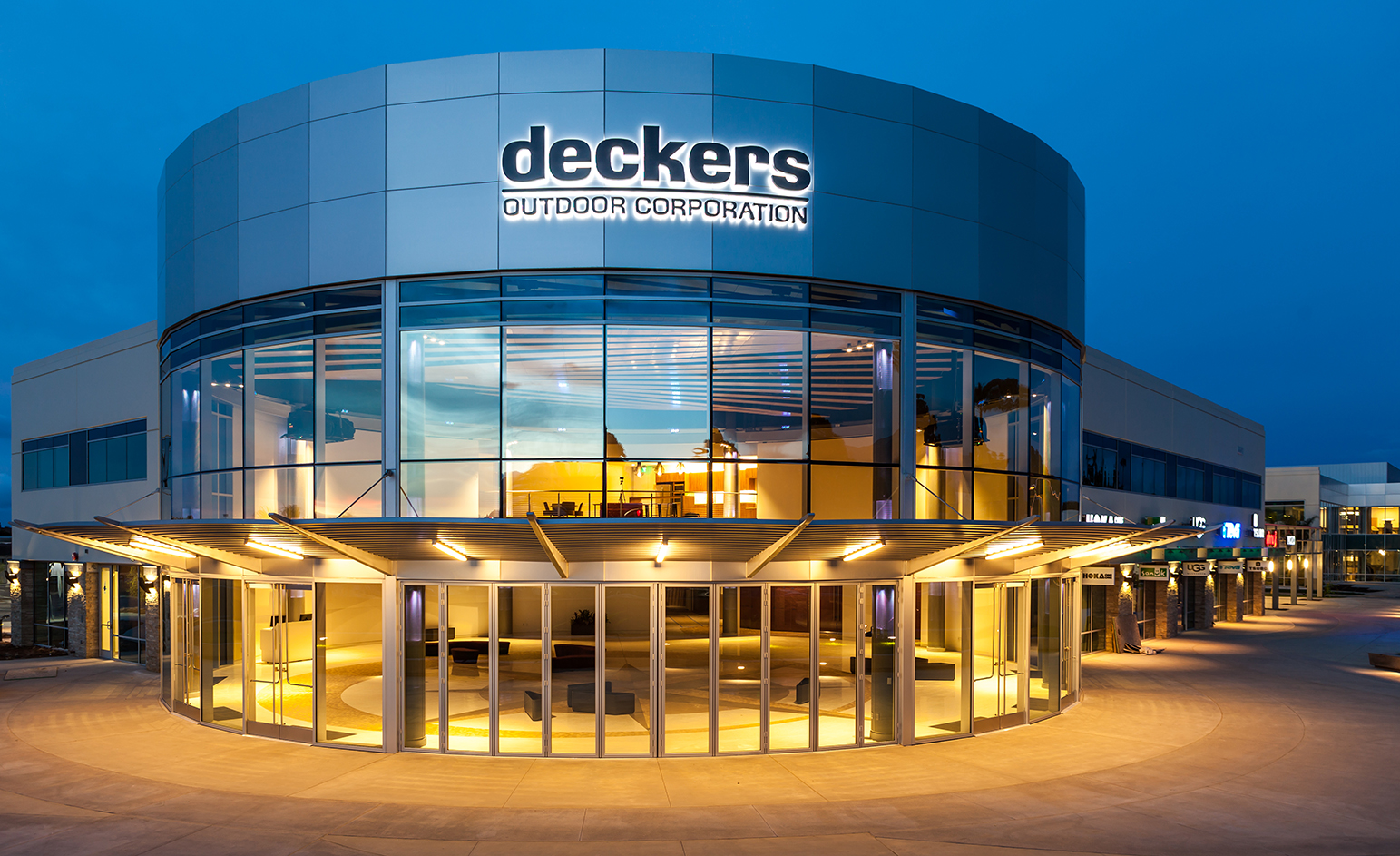
Deckers Outdoor Corporation (NYSE:DECK) Faces Market Challenges Despite Strong Brand Presence
- Telsey Advisory maintains a "Market Perform" rating for Deckers Outdoor Corporation (NYSE:DECK), with a revised price target from $120 to $105.
- Concerns over the slowing growth of the Hoka brand and a softer U.S. market contribute to a significant stock price decline and revised full-year sales projections.
- Despite facing tariffs and rising prices, Deckers is exploring mitigation strategies to attract consumers.
Deckers Outdoor Corporation (NYSE:DECK), a renowned footwear and apparel company known for its popular brands like Ugg and Hoka, operates in a competitive market against giants such as Nike and Adidas. On October 24, 2025, Telsey Advisory updated its rating for DECK to "Market Perform," maintaining its previous grade and recommending holding the stock. At that time, the stock price was $90.02, as highlighted by TheFly.
Despite the stable rating, Telsey Advisory lowered its price target for Deckers from $120 to $105. This adjustment comes amid a significant decline in DECK's stock price, which dropped 12.7% following the release of its fiscal Q2 report. Although the company exceeded expectations in earnings per share and revenue, the report led to downgrades from three major Wall Street firms. The revised price targets now range from $81 to $120, with a consensus target of $114.
The downgrades are primarily due to concerns over the slowing growth of the Hoka brand and a softer market in the U.S. Bank of America, for instance, reduced its price target from $122 to $103 while maintaining a neutral stance on the stock. Deckers' full-year revenue guidance fell short of Wall Street's expectations, despite reporting fiscal Q2 earnings of $1.82 per share, which surpassed estimates.
Deckers has adjusted its sales guidance for both Hoka and Ugg due to concerns that tariffs are negatively impacting demand. Hoka, a rising star in the running shoe market, is now projected to grow by a low-teens percentage in fiscal 2026, a decrease from the 24% growth seen in the previous year. Meanwhile, Ugg is expected to grow in the low to mid single-digit percentage range, down from a 13% growth rate in the prior year.
The company now projects full-year sales of approximately $5.35 billion, which falls short of the consensus forecast by analysts surveyed by Visible Alpha. CEO Stefano Caroti expressed concerns about a more cautious consumer base in the U.S. due to tariffs and rising prices. CFO Steven Fasching mentioned that while tariffs pose a challenge, the company is considering mitigation strategies, such as promotions, to attract shoppers.
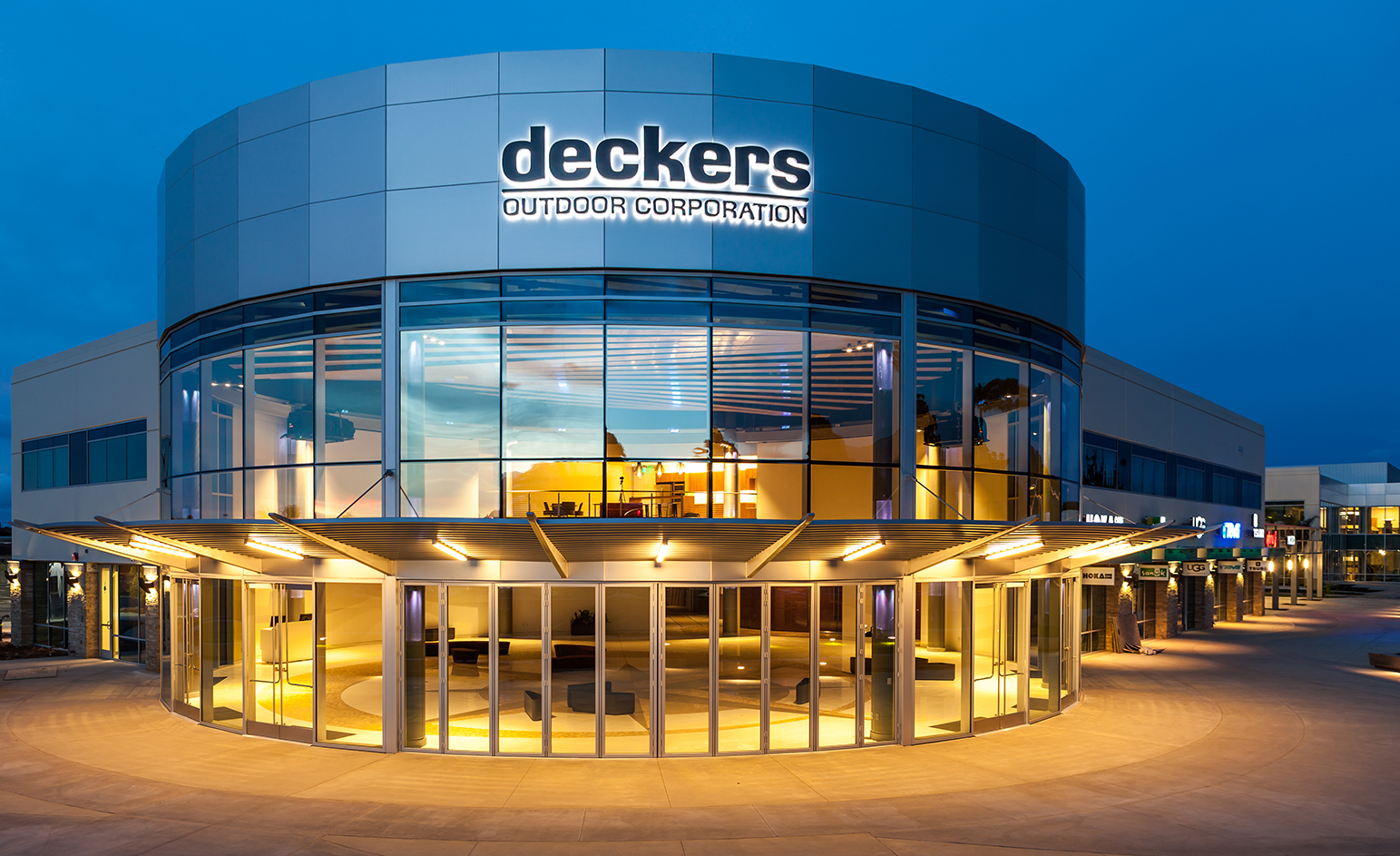
Deckers Outdoor Corporation (NYSE:DECK) Faces Market Challenges Despite Strong Brand Performance
- Deckers Outdoor Corporation (NYSE:DECK) has received a new price target from Telsey Advisory, suggesting a potential increase of approximately 16.92%.
- The company reported a 9.1% year-over-year increase in revenue and earnings per share of $1.82, surpassing Wall Street's expectations.
- Despite strong brand performance, DECK's full-year guidance fell short of analysts' expectations, leading to a significant drop in its share price.
Deckers Outdoor Corporation (NYSE:DECK), a well-known footwear and apparel company recognized for its popular brands like UGG and HOKA, operates in a competitive market, facing rivals such as Nike and Adidas. On October 24, 2025, Dana Telsey from Telsey Advisory set a new price target for DECK at $105, suggesting a potential increase of approximately 16.92% from its current price of $89.81.
Despite this optimistic outlook, DECK has faced challenges. Jim Cramer, a renowned investor, described the stock as "overly hated" due to a decline following cautious future guidance. The company surpassed Wall Street's expectations for its second-quarter earnings, reporting revenue of $1.43 billion, a 9.1% year-over-year increase, and earnings per share of $1.82, exceeding the consensus estimate of $1.58.
However, DECK's full-year guidance fell short of analysts' expectations, leading to a significant drop in its share price, falling over 14% in early trading. The company expressed concerns about macroeconomic risks, particularly tariffs-driven price increases, which could impact future sales. Despite strong brand-level performance, with HOKA sales rising 11.1% and UGG sales increasing 10.1%, the company's full-year revenue midpoint of $5.35 billion is approximately 2% below analyst expectations.
International sales showed a robust 29.3% increase, offsetting a slight 1.7% decline in domestic sales. However, concerns remain about the performance of the UGG line, which may be contributing to the stock's downturn. DECK's stock is currently priced at $89.40, experiencing a decrease of 12.81% with a drop of $13.14. The stock has fluctuated between a low of $86.83 and a high of $90.95 today, with a market capitalization of approximately $13.26 billion.
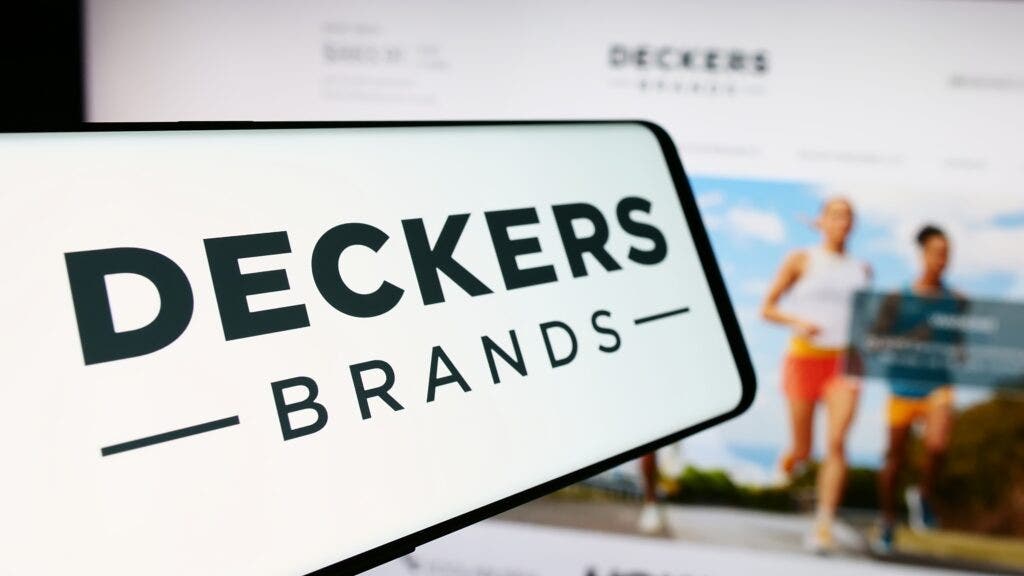
Deckers Shares Jump on Strong Q1 Results, Despite Cautious Revenue Outlook
Deckers Brands (NYSE:DECK) saw its shares rise more than 11% in premarket trading Friday after reporting first-quarter results that beat expectations, fueled by continued demand for its HOKA and UGG lines.
The company posted Q1 FY26 earnings per share of $0.93, ahead of the $0.68 projected by analysts. Revenue climbed to $965 million, topping the consensus estimate of $900.3 million.
“HOKA and UGG exceeded our expectations for the quarter, delivering strong growth to kick off fiscal year 2026,” said CEO Stefano Caroti. He added that despite global trade uncertainties, the company remained confident in its brand momentum and long-term prospects.
For the second quarter, Deckers guided for EPS between $1.50 and $1.55, exceeding the $1.40 forecast. However, it projected revenue in the range of $1.38 billion to $1.42 billion, falling short of the $1.51 billion consensus.
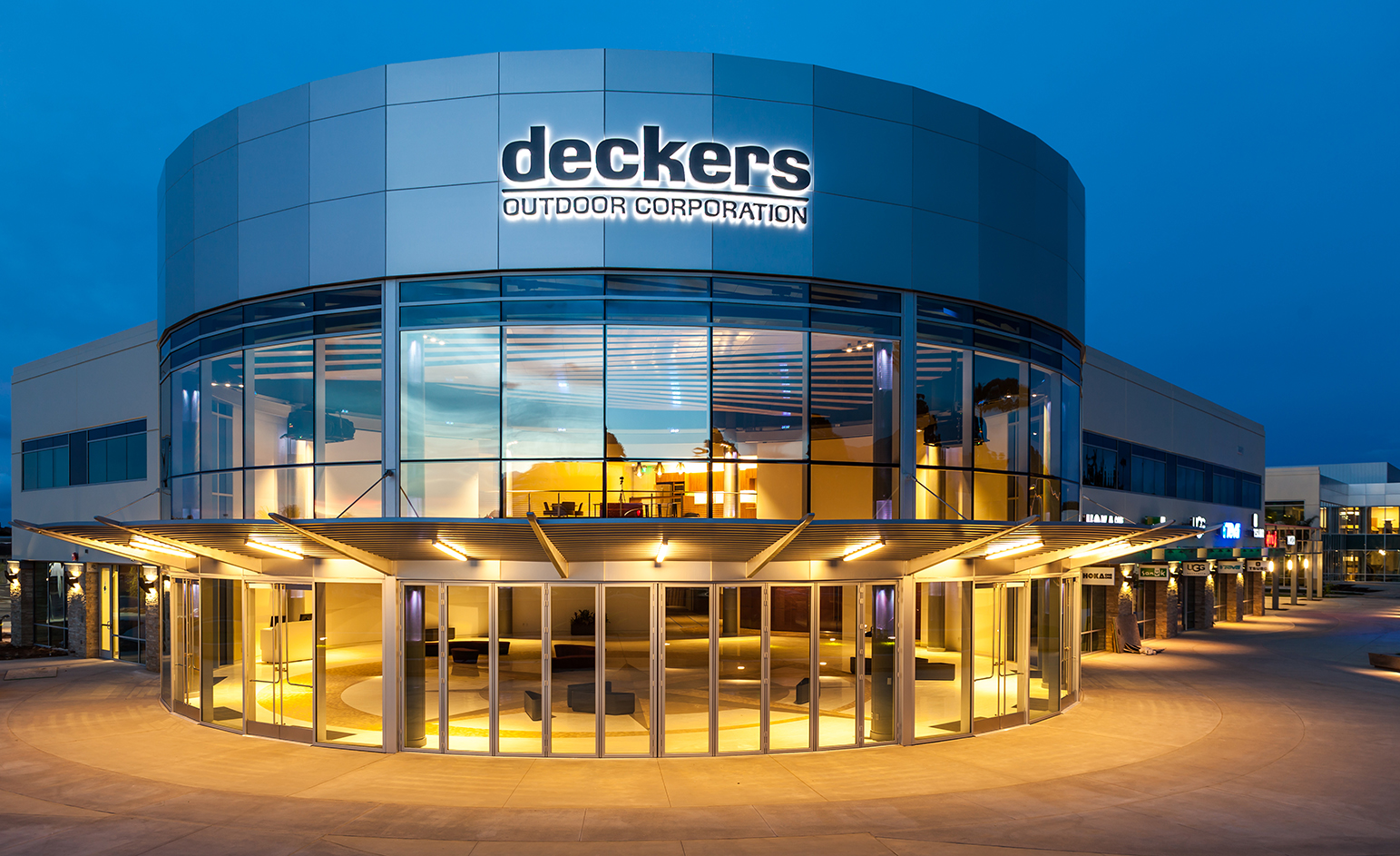
Deckers Outdoor Corp (NYSE:DECK) Faces Downgrade Amid Strong Q4 Performance
- Deckers Outdoor Corp (NYSE:DECK) was downgraded by Telsey Advisory from "Outperform" to "Market Perform" despite surpassing Q4 revenue and earnings expectations.
- The company reported a Q4 revenue of $1.02 billion and earnings per share of $1, indicating a robust financial performance.
- Deckers projects Q1 revenue between $890 million and $910 million, below market estimates, amidst leadership changes and global trade challenges.
Deckers Outdoor Corp (NYSE:DECK), a prominent player in the footwear and apparel industry known for its HOKA and UGG brands, experienced a rating downgrade from "Outperform" to "Market Perform" by Telsey Advisory on May 23, 2025, as reported by Benzinga. This came after the announcement of DECK's Q4 results, with the stock price at $101.36.
Despite the downgrade, Deckers showcased a strong financial performance in the fourth quarter of fiscal 2025. The company achieved a revenue of $1.02 billion, slightly above the market's expectation of $1.01 billion. Furthermore, its earnings per share were $1, significantly outperforming the forecasted 59 cents per share. This performance underscores Deckers' capability to exceed market expectations.
Stefano Caroti, President and CEO, expressed optimism about the future of Deckers' brands, HOKA and UGG, despite facing global trade challenges. The company also witnessed a leadership transition, with Cynthia Davis taking over as board chair from Michael Devine, who retired after 14 years. This marks a new era in Deckers' leadership.
Looking forward, Deckers anticipates first-quarter revenue to be between $890 million and $910 million, which is below the market estimate of $925.86 million. The company also expects earnings per share to range from 62 cents to 67 cents, below the anticipated 81 cents. Due to macroeconomic uncertainty, Deckers has decided to withhold full-year guidance.
Currently, DECK's stock is priced at $101.53, reflecting a 19.48% decrease with a change of $24.56. The stock has seen fluctuations between $96.12 and $102.87 during the day. Over the past year, DECK reached a high of $223.98 and a low of $93.72. The company's market capitalization stands at approximately $15.41 billion, with a trading volume of 16 million shares.

Deckers Stock Crashes 20% on Weak Q1 Outlook Despite Q4 Beat
Deckers Outdoor (NYSE:DECK) shares plunged over 20% intra-day today after the footwear maker issued disappointing guidance for the current quarter, overshadowing its better-than-expected fourth-quarter earnings and revenue.
The company reported Q4 adjusted earnings per share of $1.00, well ahead of the $0.59 analyst estimate. Revenue rose 6.5% year-over-year to $1.02 billion, slightly above the $1.01 billion consensus.
Brand performance was mixed: HOKA grew 10% year-over-year but fell short of the 14.3% consensus, while UGG exceeded expectations with 3.6% growth versus an anticipated decline of nearly 5%.
However, investor sentiment turned sharply negative on the company’s fiscal Q1 2026 forecast. Deckers expects EPS of $0.62–$0.67, missing the $0.79 consensus, and revenue of $890–$910 million, below the $925.3 million estimate.
The weak near-term outlook fueled concerns about slowing momentum in key brands and pressured the stock despite a solid Q4 close to the fiscal year.

Deckers Stock Plunges 13% Despite Record Earnings and Upbeat Outlook
Deckers Outdoor (NYSE:DECK) delivered a stellar third-quarter performance, beating Wall Street estimates on both earnings and revenue, yet its stock tumbled 13% in pre-market trading on Friday as investors reacted cautiously despite an improved full-year outlook.
The company reported adjusted earnings per share of $3.00 for the fiscal third quarter of 2025, handily surpassing analyst projections of $2.46. Revenue surged 17% year-over-year to a record $1.83 billion, exceeding the expected $1.7 billion.
Deckers now expects earnings per share between $5.75 and $5.80, topping analyst forecasts of $5.64. The company also lifted its revenue growth outlook to 15% for the fiscal year.
CEO Stefano Caroti emphasized the company’s success in capitalizing on consumer demand, particularly for its flagship UGG brand, which saw significant global traction. The HOKA brand also posted strong growth, reflecting the company’s focus on performance-driven innovation.
While Deckers’ fundamentals appear solid, the steep stock decline suggests investor concerns over valuation or potential future growth trends. Nonetheless, the company remains confident in its momentum heading into the remainder of the fiscal year.

Deckers Stock Plunges 13% Despite Record Earnings and Upbeat Outlook
Deckers Outdoor (NYSE:DECK) delivered a stellar third-quarter performance, beating Wall Street estimates on both earnings and revenue, yet its stock tumbled 13% in pre-market trading on Friday as investors reacted cautiously despite an improved full-year outlook.
The company reported adjusted earnings per share of $3.00 for the fiscal third quarter of 2025, handily surpassing analyst projections of $2.46. Revenue surged 17% year-over-year to a record $1.83 billion, exceeding the expected $1.7 billion.
Deckers now expects earnings per share between $5.75 and $5.80, topping analyst forecasts of $5.64. The company also lifted its revenue growth outlook to 15% for the fiscal year.
CEO Stefano Caroti emphasized the company’s success in capitalizing on consumer demand, particularly for its flagship UGG brand, which saw significant global traction. The HOKA brand also posted strong growth, reflecting the company’s focus on performance-driven innovation.
While Deckers’ fundamentals appear solid, the steep stock decline suggests investor concerns over valuation or potential future growth trends. Nonetheless, the company remains confident in its momentum heading into the remainder of the fiscal year.







